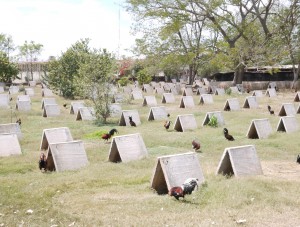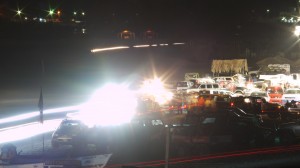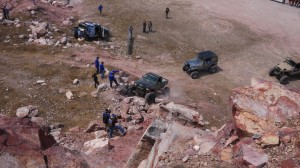by Zev Gottdeiner
Often, we think about cultural difference as having to do with the apparent. We focus on surface assumptions like language, geography, phenomenology, or metaphysics. This distinction frames how we view difference. That this mode of belonging to something whose borders we have come to accept operates on every aspect of our lives in oft-unconscious ways, contradicts definitions of free will, nostalgic preoccupation with destiny, and makes us realize how alike we are.
Take, for example, this fighting cock farm [figure 1], located in a rural town in the foothills. The proprietor was happy to let you in to snap some photos and discuss his business, booming even in these times of depression. Oddly enough, this farm lays aside a graveyard, the pair separated by a low wall, and the parallel landscapes were oddly contiguous.
What place, you might ask, does cockfighting have in what is generally accepted as society? Well, the question might be: What good is a definition of society that cannot allow for the practice of cockfighting? If we take into account what Clifford Geertz has said, our opinions might change significantly. However, to what ends will our opinions cater to? Is the rampant multiculturalism, which anthropology—or rather the mediation of anthropology—remains fairly complicit in, seeking to assimilate these practices into a safely demarcated othering of the Other? To that end, is the safeguarded western metaphysics inundating our everyday interaction only reifying that which is not us in a manner that transforms it at the semiotic level into that which we know to be? Furthermore, to what extremes might we go in the name of understanding? That is, could the burning of trash be seen as a uniquely cultural practice, and if so, what does it say about the group at large? Is status really the operating principle of these actors?
How can we maneuver between polar extremes of morality or understanding without entrenching ourselves on one side of the dichotomy between hard line Cultural Relativism, and Animal (including human) Rights Activism? Can we reconcile difference to an overarching cultural fetishism that leads some groups to one worldview and another, another? If so, some basic understanding should be available, some way for the similarities to line up between, eco-tourism and the developing regions in which they operate. While involving bio-interrelatedness, the situation also has a great deal to do with material culture, and the proclivities of power in all its diffuse manifestations.
For example, what can we make of the Jeeperos? They came to the island the weekend before Benito Juarez’s birthday, parading down the entire 18km of beach from the island road (Route 17), at night, in a scene of Mad Max proportions [figure 2].
The next afternoon saw the mob enervating the beach, gathering at the restaurants, showing off their odd angle jeeps and overindulged trucking manipulations of Fords, Chevys, or the odd Toyota—though not many un-American. The red of the setback sunset like a liter of spilled hibiscus tea on a baby blue beach towel. A Hummer and a Tundra mosey, representative of the small class of ‘weekend’ off-roaders who pride themselves on status cars over the pure performance monsters, a subset who garners the scorn heaped by those purists with rugged, beat up chassis hiding unimaginable torque-heavy engine blocks, secret flood lights, and independent suspension systems that hug mountainsides like baby lemurs in a thunderstorm. The 4x4s of the islanders muddle in distant revving down by the Malakai, a bar which at one point not so many years ago was the receptacle of much insanity and subsequent authoritative attention
A friend had this to say about them:
Yep, they belong to a Club, most of these “Jeeperos” are rich or at least affluent and educated; doctors, lawyers, juniors and such. One of them is a friend of mine and told me that they used to go to places where narcos control most of the rough terrain areas and scared them off. According to my sources, they got a permit to land on Stone Island, they chose the Island because there is only one route out, so if there was ever a violent incident like a car jacking, anyone can easily be tracked and caught.
Though, increasingly, the exportation of U.S. sign regimes, and consumption habits, (behold, the Golden Arches! My name is Ozymandias, king of kings: Look on my works, ye Mighty, and despair!) reeks of invasion, these “meta-symbols,” as Daniel Miller called them should not be analyzed as “a fear of objects supplanting people,” but through the meanings attached to local use, value, and significance. The connotative dimension of jeepero culture supplants the normative definition of status goods and conspicuous consumption in a number of ways. Firstly, the bulk of the money goes into the insides of these cars, and thus relegates specific recognition of these high status parts to a distinct class of expert. There were no Hummers climbing the cliffs. This expertise links not to the Jeepero subculture itself, but to that of the performance automotive world, and specifically, that of 4x4s. So, we have a value based more on performance than commercialism. (However, debating the upper echelons of shocks and struts probably entails a good deal of conspicuous posturing).
Secondly, the value derived from the subcultural practice extends beyond its boundaries, as the jeeperos were on the island for an event and competition, watched by hundreds from bleachers and from the top of the hill [figure 3]. Another reason they held the event on the island was that the municipal authorities refused to issue them a permit, although there was considerable independent promotion. The subculture, as a whole or partial entity based on geographic location, takes part in society, in capitalism and public spectacle. It attracts visitors to the island, in addition to the hundreds of competitors and their entourages not the least of whom have dune buggies and trucks of their own. The participation of the members extends from the regional scale to the local, and those gathered on the beach near their steeds were eager to talk about what? Well, about their cars, and the ensuing exchange becomes barely understandable for all the jargon involved. But the man is smiling the whole time, and everyone around seems to be having a real good time.
Thirdly, an ironic turn to the conceptual ties with freedom that invariably comes with jeep culture. Ironic because, in the importation of what could be considered ‘American’ in the pejorative sense, rather than the geohistoric somos amaericanos way, comes to embody the freedom to take over a beach community, hire earthmovers to further erode the side of the hill, and otherwise exercise your—ahem—muscle. The locals even take it in like any developing community1 would, with disdain for the trash and noise, but with a peaked interest once the show starts.
In dealing with difference, you cant be quick to judge, but you cant withhold a response, because we all have responsibility just by being in a place. The trick is to see beyond the limits of experience, be there if necessary when the changes happen; turn witness to your own limits and training. It’s not enough to chalk up understanding as if you’re examining it in a crime scene – as if it’s already dead. You let it happen, emerge, bear witness if you feel sufficiently connected, but never silently.
Pretty soon, you’re up on the hill top, sitting amongst local families privy to the spot from which you can peer down at all the action. A referee stops the driver of the black truck above, and signals for the small boy sitting in the bed to get out. You look up at the couple next to you, sitting with their kids, and the mother meets your eyes. She clucks her tongue and everyone stirs in disapproval of the man before the show goes on and he climbs the boulders. As you walk back down toward the beach, the passing convoy smiles, kids play in the kicked-up dust, and you begin to feel the turn of the world. You find a small ray washed up on the beach, and you take it home to dry out on your porch.
1 The ‘development’ here is economically cyclical in that regardless of infrastructure, the money comes in only some months of the year. Tourism is cyclical here; fishing too, because of the hurricanes. Agriculture is a de facto cyclical industry, as are cattle ranching and shrimp farming.









